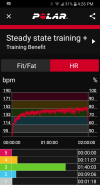Antti
Level 10 Valued Member
Thanks for sharing this!
Ultimately, the idea behind base building which incorporates the two ends of the spectrum (if you want to call it that) is that balancing out how you train will in the end result in the best long-term adaptations at the least biological cost. HR metrics are only one component. There may be other markers of longer term quality of life that could be relevant here.
I’m actually a reluctant convert. I didn’t even begin any physical training until my late 30s. Originally I only did kettlebell training, loved it and still love it, but after starting to incorporate more aerobic work in, I’ve found it to be more beneficial that just kettlebell (or general strength) training alone. They balance each other out nicely.
Rather than trying to convince you of something, perhaps experiment with it yourself…
For the next 1-2 years take those 300-400 minutes of training time per week and split it between the strength training you do now and aerobic development and see what happens. You might surprise yourself and find something new you enjoy and enhance your quality of life in ways you didn’t anticipate. If at the end of that 1-2 years, it’s been a detractor or not a value add, then shift back to your original mode of operation. I don’t know how old you are, but if you live another 50 years, that’s only 2-4% of the rest of your life and aerobic development both takes a longer, but that doesn’t mean that the benefits aren’t powerful.
Cheers.
Thanks for the advice.
However, that is a massive, massive investment you're asking for.
I don't like cardio. The biggest reason for my training is my enjoyment. I also compete in strength sports, so I need to spend a lot of time on strength training.
I don't believe there is anything in the aerobic base building for me. I don't feel there is anything in it.
I also don't see any peer reviewed science advising for it, for more than I already do. I don't see a rational reason to do it.
If I won the lottery and didn't have to work, I would likely try it out in some way, if for nothing else just to see if I like it or not. However, I don't have the time to try it out now as I see the chance of it being beneficial so low.

